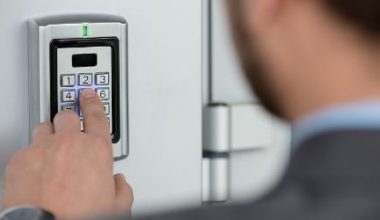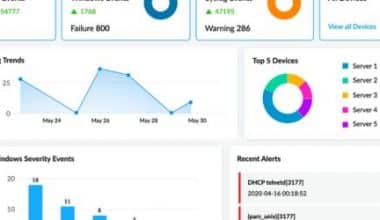The hospitality industry is following the trend of other modern businesses by embracing technology. Hotel operators can gain a lot from investing in technology, from enhancing day-to-day operations to simplifying administrative procedures. A hospitality management system (HMS) is a useful piece of software that every hotel owner should think about purchasing. Several alternatives exist for hotels looking to invest in hospitality software, so it’s important to make sure you choose the one that works best for your establishment. In this post, you will get to know the system and software used for hospitality management.
Let’s fly…
Hospitality Management System
A hospitality management system streamlines the process by which staff members discover and address rooms in need of repair, notifies housekeeping of impending guest arrivals so they may get ready for individual rooms in advance, and informs staff members of guest check-in and check-out times with their software.
Your hotel’s room management will be more adaptable, improving the stay for all guests and allowing for quicker check-ins. Depending on the scale of your hotel, keeping up with maintenance and responding to each individual room can be a herculean undertaking, which can lead to delays in getting guest rooms ready before check-in. However, below are the different system to go for as a CEO or a learner studying hospitality management system.
#1. Contactless Payment Systems
Even after extensive immunizations, many individuals are still wary of booking a hotel stay due to COVID fears. Consumer surveys have shown that allowing contactless payment methods is at the top of the list of things that the hospitality industry can do to make guests feel more at ease. More hotels may start taking cryptocurrencies like Bitcoin in the future thanks to advances in modern payment processing.
#2. Website Chatbots
Chatbots on a company’s website are now a standard amenity for the hospitality industry. At all hours of the day and night, chatbots can respond to the most frequently asked questions from hotel guests, while forwarding more complex inquiries to the next available member of the hotel staff. Staff members can refer back to the first conversation with the customer for context, and customers get faster responses. To make their chatbots more lifelike and to keep an eye on their social media channels, some of the larger hotel chains are even implementing Artificial Intelligence (AI).
#3. Automatic Mobile Check-In
Both hotels and guests can benefit from mobile check-in. With mobile check-in available through an app, a large lobby desk is unnecessary. The hotel’s personnel will have more time on their hands, and the hotel’s physical space will be more adaptable for uses like luggage storage, common areas, and branded merchandise counters.
Because of the convenience of mobile check-in, guests no longer have to wait in line at the front desk, which is especially helpful for business travelers and families with young children.
#4. Branded Conceirge Apps
Hotel guests can use concierge applications to arrange their entire stay from the convenience of their own smartphones. Concierge apps can incorporate chatbots to make the guest experience more engaging and personalized by recommending nearby restaurants, sights, and activities.
Tablets in guest rooms, equipped with concierge apps and other useful information, have replaced room service menus and brochures at several hotels. Tablets simplify visitors’ experiences and free up hotel employees for more individualized care.
#5. Keyless Entry Systems
Keyless access solutions, such as smartphone-activated doors and locks that utilize facial or fingerprint recognition technology, have seen a surge in popularity as a result of the pandemic. There’s hope that the all-too-common problem of misplacing the room key may soon become a thing of the past. Hotels will save money by not having to replace lost keys, and guests will save time by not having to ask for the key at the front desk.
See also: 2023 Best KEYLESS ENTRY SYSTEMS FOR BUSINESS (Updated)
#6. Advanced Wifi Infrastructure
Nowadays, having access to a fast and reliable wifi network is essential for both professional and personal use. In order to accommodate customers who need to work online, stream media, make video calls, play games, and so on, hotels will have to move away from the user-pay model and supply sufficient bandwidth. Exciting new wifi technologies, such as WiFi6, can be up to 30% quicker than our present system. Smart gadgets in hotel rooms can benefit from Wifi6’s enhanced connectivity.
Hotels are using Near Field Communication Technology in addition to modernizing their wifi networks (NFC). To share information between close devices, NFC employs high-frequency, short-range communication. Using near-field communication (NFC) technology, guests may check-in via their smartphones and gain access to their rooms without using a key or a door key.
#7. Voice Control
Voice search and online assistants like Amazon’s Alexa, Apple’s Siri, Android’s Bixby, and Google Assistant are becoming increasingly popular as voice recognition technology improves.
By using their voices, guests in voice-controlled rooms can avoid touching commonly touched objects like light switches and thermostats. Guests with disabilities, such as the visually impaired, those with arthritis, or those with other physical limitations, can also benefit from using voice control. After a long flight, guests can relax with a bottle of wine, a warm bath, or some Netflix. All by simply speaking to the room’s voice assistant.
#8. Energy-Saving Tech
Information provided by Energy Star indicates that annual energy expenses for hotels total $2,196 per room. Smart lighting and climate control systems can reduce energy consumption by as much as 20 percent and carbon dioxide emissions by as much as 70 percent. LED lighting can help hotels save energy because it uses 75% less power than incandescent lights do.
#9. Robotics
One of the most fascinating developments in cleaning technology is the increasing use of robots for this task. As a result of the epidemic, the use of robots went from being a theoretical possibility to an immediate necessity. Avoiding human contact is one of the best ways to prevent the transmission of the respiratory virus Covid, and this is exactly what robots for hotels can do.
#10. Conference Rooms with High-Tech Amenities
More and more businesses are allowing their employees the flexibility to work from home, and a growing number of people are striking out on their own to pursue freelance professions or become digital nomads, all of which have contributed to a surge in demand for tech lounges and other co-working spaces.
Hotels that want to attract business travelers in today’s digitally connected world must also offer wired meeting spaces. After the advent of Zoom conferences, antiquated audiovisual equipment became obsolete.
Hospitality Management System Software
The integration of a channel manager and a software booking engine into a hotel’s hospitality property management system is essential. It helps them control the flow of hotel business and allocate available rooms. Fewer, more tightly connected systems are preferable to using a wide variety of software to complete the task. The appropriate hospitality management system software can assist you with it and they are:
#1. Cloudbeds
Cloudbeds is a hotel management suite designed to provide innkeepers and hosts with a streamlined and efficient means of overseeing the day-to-day operations of their establishment. Because everything in Cloudbeds is connected, all you need is one login and password. Cloudbeds is the world’s most rapidly expanding hospitality management software suite, with features for running hotels of any size. The Cloudbeds package consists of a robust Property Management System (PMS), a market-leading Channel Manager, a conversion-driven Booking Engine, and integrated Payments, and is relied on by numerous hotels, hostels, inns, and various lodging in more than 157 countries.
#2. Little Hotelier
Little Hotelier is the only hotel management system that was built from the ground up to satisfy the demands of small companies. This includes making it simple to manage your property, convert direct bookings, keep your website updated, and accept online payments. We equip you with everything you need to manage your company on the move, including a mobile app. Our system is easy to use, requires little time to set up, and provides prompt, reliable support around the clock.
#3. RoomRaccoon Hospitality Management System
Everything you need to run your hotel business is included in RoomRaccoon’s All-In-One Cloud Hotel Management System, from a property management system with a variety of built-in features to an integrated booking engine that captures 40% more direct bookings on your website and a channel manager for instant rate and availability distribution across multiple booking channels.
RoomRaccoon is a complete hospitality management system (PMS) that includes a booking engine and channel manager, allowing for seamless control of your hotel from one central location. There will be no more cumbersome integrations or clunky technology stacks. Simply put, the accuracy of automation. RoomRaccoon stands out in the competitive technology market because of the many ways in which it can boost your hotel’s revenue per available room (RevPAR). You’ll be able to increase your property’s earnings with no effort thanks to in-built upselling and yield management capabilities.
#4. WebRezPro Hospitality Management System
WebRezPro is a cloud-based property management system that provides hotels of any sort with increased efficiency, automation, and scalability to boost productivity and income. Modernizing and streamlining front and back office operations, the feature-rich yet user-friendly system handles everything from reservations and inventory to accounting and reporting.
For hotels of any size, WebRezPro is the ideal cloud-based property management solution. The fully unified and automated system streamlines and modernizes front desk and back office operations, saving hotel operators time and increasing income. World Web Technologies Inc., an Internet marketing and software firm specializing in the hospitality industry has been around since 1994, and their product WebRezPro has brought the conveniences of the cloud to more than 1,500 establishments in 40 countries.
#5. ResNexus Software Hospitality Management System
The ResNexus cloud-based property management system (PMS) helps you save both time and money. Your hotel can manage its front desk and take in more guests with the help of ResNexus. ResNexus is an all-in-one solution that provides ADA-compliant websites, contactless check-in, a user-friendly online booking engine, integrated marketing, channel management, text messaging, reputation management, revenue management, and much more.
#6. ThinkReservations
You can feel more in charge of your business while saving time and effort. ThinkReservations is brisk, expert, and complete; it is also intuitive and easy to use. You didn’t get into this field to be an office drone, we know. You and your staff may spend less time “doing” and more time “building” your company with the help of our unified property management platform, which includes a booking engine and channel manager. For a no-cost demonstration, please get in touch with us.
#7. innRoad All-in-1 HMS
Thousands of hotels throughout the world rely on innRoad, which is hotel management software that has won numerous awards. innRoad is a booking platform that was made with independent hotels in mind. It is well-known for its ability to streamline operations, increase occupancy and revenue, and provide a more pleasant experience for visitors.
Increases of 20% in direct bookings and 10% in room income have been reported by hotels using innRoad. Further, customers have reported saving an average of $57 per month on processing fees since switching to innRoad’s in-house credit card processing. Dedicated installation experts and round-the-clock live customer assistance are two of innRoad’s most praised features.
innRoad is a SaaS (Software as a Service) hotel software system that unifies property management, global distribution, bookings, and marketing into one streamlined interface for the benefit of boutique hotels, independent hotel chains, and hotel management firms of all sizes.
Why Choose Hospitality Management System Software
- They have a staff of hard-working experts who are ready to assist you.
- You can communicate with developers without any hitches and tell them exactly what you need.
- Our software solutions are built to improve productivity for both your company and its employees.
- They always meet or exceed deadlines for delivering our software solutions.
- They guarantee that you will be happy with our solutions.
- When our customers need help, we’re here for them around the clock.
- To further ensure open communication with our clients, we regularly update them on the status of their projects.
What Is the Hospitality Management System?
A hospitality management system streamlines the process by which staff members discover and address rooms in need of repair; housekeeping is informed in real-time of guests’ impending arrivals in order to adequately prepare for their stays, and staff members are kept up to date as guests check in and out of the hotel.
What Are the Two Types of Systems in the Hospitality Industry?
Hard and soft systems are the two most common categories of computer architecture. As a part of the systems process, where outcomes are exact, measurable, and controllable, hard systems are primarily the technology, machinery, or tools needed to carry out the work at hand or generate the good or service in question. Hospitality management information systems, property management software, hotel reservation systems, and food production facilities are all examples of robust systems. Contrarily, marketing strategy, overall quality management, financial forecasting, and personnel selection are all examples of soft systems that combine technology and the human resource aspect.
Due to individual differences in thought and action, and since human resources play a role in making systems function, soft systems can occasionally result in unexpected behavior. Ability, skill, motivation, and the environment in which an individual interprets the system are all aspects of the human resource element.
What Are the Benefits of Hospitality Management?
Here are five of the industry’s most appealing perks that can’t be denied.
- It’s Expanding: The hospitality sector is flourishing, which is not surprising.
- It’s Profitable: Make a good living and help people at the same time by entering the hospitality sector.
- You’ll be exposed to interesting new people: When you work in the hospitality sector, you’ll always be exposed to new people. After all, the success of a hospitality business depends on the quality of the interactions that its employees and customers have with its customers.
- The atmosphere is casual and conducive to work: There is a lot of room for informality in the hotel industry, which is another plus. While the work itself may not always be simple, the workplace atmosphere is often more laid back and casual than in other fields.
- You Can Train for It: Those interested in a career in the hotel sector can take advantage of a variety of educational opportunities to help them achieve their goals. This course will teach you the ins and outs of the hospitality business and equip you with the skills necessary to succeed in this competitive field.
What Is the Basic Hospitality Management Concept?
The term “hospitality management” is used to describe the practice of employing management theories and methodical supervision in the hospitality industries of lodging, catering, and other service provision.
What Is the Importance of Management Systems to the Hospitality and Tourism Industry?
A company’s performance is highly dependent on the management team’s skill in coordinating the many internal and external elements that have an impact on its operations. Managers in the hotel business need to be versatile and able to handle a wide range of responsibilities.
What Is the Role of the Hospitality Information System?
Hospitality information systems, or HISs, are a set of interconnected computer programs designed to aid in the management and daily operations of the hospitality industry.
What Is the Hospitality Management System?
A hospitality management system streamlines the process by which staff members discover and address rooms in need of repair; housekeeping is informed in real-time of guests’ impending arrivals in order to adequately prepare for their stays, and staff members are kept up to date as guests check in and out of the hotel.
What Are the Two Types of Systems in the Hospitality Industry?
Hard and soft systems are the two most common categories of computer architecture. As a part of the systems process, where outcomes are exact, measurable, and controllable, hard systems are primarily the technology, machinery, or tools needed to carry out the work at hand or generate the good or service in question.
What Is the Best Hospitality Management Software?
Below is the best hospitality software that can assist you with what you exactly want:
- Cloudbeds
- Little Hotelier
- RoomRaccoon HMS
- WebRezPro Hospitality Management System
- ResNexus
- ThinkReservations
Related Articles
- Checklist Apps – A Need For the Hospitality Industry
- WRITING A CHECK: Step-by-Step Guide to Writing a Check
- Casino Marketing: Unique Strategies & Ideas that Work






